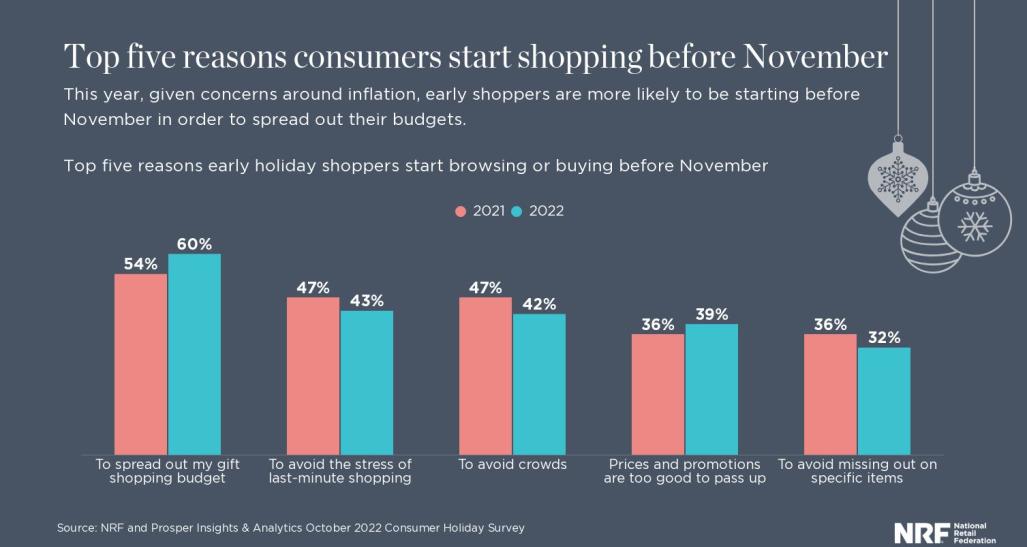
Last week, NRF Chief Economist Jack Kleinhenz and Senior Director of Industry and Consumer Insights Katherine Cullen hosted NRF’s 2022 Holiday Retail Sales Forecast webinar to discuss key insights and the effect of inflation on consumer spending and shopping trends. Read more about the webinar below.
Inflation and the economic environment
Inflation continues to be a dominant concern for retailers and consumers alike. As reported in November’s Monthly Economic Review, real gross domestic product increased 2.6% in the third quarter of 2022, showcasing a healthy economic increase that sets the tone for the fourth quarter. Kleinhenz said consumer spending is the largest contributor to that economic growth.
Learn more about the latest holiday shopping data for this season on our winter holidays headquarters.
The personal consumption expenditure index shows an average increase of 6.2% year-over-year, with an 8.1% increase on a year-over-year basis for goods and 5.3% for services as of September 2022, according to the U.S. Bureau of Economic Analysis. That’s an important index to consider because PCE accounts for substitution, a large factor for consumers shopping in an inflated market.
“Consumer demand really remains intact even though we are seeing rising interest rates, persistent inflation, [and] certainly political uncertainty,” Kleinhenz said.
Holiday sales
Kleinhenz predicts healthy holiday sales as consumer spending continues to reinforce economic activity.
Holiday retail sales are predicted to grow by 6-8% this year. Ecommerce sales are included in the holiday forecast and are predicted to grow between 10% and 12% in this year’s holiday season.

Consumer spending behavior
For over a decade, NRF and Prosper Insights & Analytics have asked consumers if the state of the U.S. economy is impacting their spending plans for the winter holidays. In 2009, during the Great Recession, more than 60% of individuals indicated that the economy was impacting their holiday spending plans. This year, consumers have returned to 2009 levels of concern about the state of the economy, though Cullen said there is little evidence of past behavior from the Great Recession returning as many are still planning to spend.
Almost two-thirds of holiday shoppers acknowledge that it is important to spend on holiday gifts and celebrations. And holiday shoppers estimate they will spend an average of $832.84 on gifts and holiday items this year, which is in line with the 10-year average.

“Almost regardless of what’s going on in the economy, consumers want to celebrate holidays,” Cullen said. “They want to give gifts to their loved ones, and they want to make this time of year feel special.”
However, consumers are feeling the impact of inflation in different ways. Higher-income consumers are planning to spend more than they did in 2021, while lower- to middle-income individuals are more cautious when setting budgets for the holiday season.

Consumers continue to shop early
As in past years, many consumers are continuing to begin holiday shopping before November. This year, consumers report the top reason they are shopping early is to spread out their holiday budget for gift shopping, as they try to avoid spending a large amount of their budget all at once.

Travel and weather
According to Transportation Security Administration screening data, travel activity has increased compared with last year and is similar to patterns seen in 2019.
The National Oceanic and Atmospheric Administration predicts warmer-than-average weather early this winter across the contiguous United States, with wetter-than-average conditions to the west, including regions of western Alaska, the Pacific Northwest, northern Rockies, Great Lakes and the Ohio Valley.
For more insights on NRF’s 2022 holiday forecast, view the webinar recording or visit NRF’s Winter Holidays web page.


